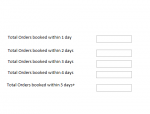demogorgan
Registered User.
- Local time
- Today, 02:40
- Joined
- Nov 29, 2017
- Messages
- 37
Hi,
So I have made a simple database & have it linking to forms & a few reports, again basic.
I have however a requirement where I have two dates, a start & finish date for each record in my table.
What I need to be able to do is calculate the difference between the two dates & then total the different numbers in a report / form, so how many records have a difference of 1 day, 2 days etc.
I have worked out how to calculate the difference in a query using the following.
But now I am stumped, I cannot seem to work the last part out.
Any help would be greatly appreciated
Thanks in advance
Demo
So I have made a simple database & have it linking to forms & a few reports, again basic.
I have however a requirement where I have two dates, a start & finish date for each record in my table.
What I need to be able to do is calculate the difference between the two dates & then total the different numbers in a report / form, so how many records have a difference of 1 day, 2 days etc.
I have worked out how to calculate the difference in a query using the following.
Code:
DateDiff("d",[Creation Date],[Date_Booking_Confirmed])But now I am stumped, I cannot seem to work the last part out.
Any help would be greatly appreciated
Thanks in advance
Demo

